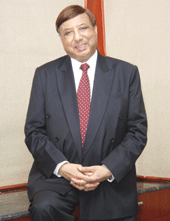Dilip Thakore interviewed Dr. Ashok K. Chauhan, founder president of the Ritnand Balved Foundation and chairman of the Amity Group, which has promoted and manages 150 education institutions — including the Amity University, Uttar Pradesh; Amity University, Rajasthan and 15 Amity Global Business Schools in India and abroad — in his office in the state-of-the-art Noida campus of Amity. Excerpts from the 60 minute interview:
Within the span of less than 20 years the Amity Group has established 15 schools, 150 education institutes and two universities with an aggregate enrolment of 65,000 students. What are the main objectives of the Amity group of institutions?
 The main objective behind the promotion of Amity Group of educa-tion institutions was — and remains — the development of nation-building citizens. It is my belief that India with its young population, ancient culture and deep philosophic foundations can change the world. But it can do so only if its youth are given access to high quality education which will transform them into contributing, well-educated citizens. To provide high quality education to the country’s children and youth is the motivation and purpose of the Amity Group.
The main objective behind the promotion of Amity Group of educa-tion institutions was — and remains — the development of nation-building citizens. It is my belief that India with its young population, ancient culture and deep philosophic foundations can change the world. But it can do so only if its youth are given access to high quality education which will transform them into contributing, well-educated citizens. To provide high quality education to the country’s children and youth is the motivation and purpose of the Amity Group.
As for the speed with which the Amity Group has grown, this is because we are highly motivated and determined — no matter the cost — to provide high quality education to the world’s largest youth population. I also derive strength and motivation from the fact that my grandfather promoted gurukuls in Jwalapur, near Haridwar and both my parents funded and studied in gurukuls. From them I inherited the tradition of respect for education which includes Indian values, ethos, traditions and philanthropy.
Central and state governments in India tend to discourage private initiatives in higher education in particular. In the circumstances how do you explain the rapid growth and expansion of the Amity group?
In a society like ours with strong traditions, new initiatives are always resisted initially. Undoubtedly we had to struggle hard and experience great suspicion and frustration to promote and establish our education institutions. But because we were determined and our mission is noble, with God’s grace we succeeded in creating awareness that we are working to develop institutions of high quality education in the national interest. In recent times after the re-election of the UPA government early this year, there is renewed government focus on education, and growing awareness of the importance of public-private partnerships, and private sector education providers. I believe the tide is turning and there is fresh thinking in the Union HRD ministry under the new minister, Kapil Sibal.
How clear and transparent are central and state laws relating to private initiatives in K-12, collegiate and university education?
Slowly but surely they are becoming more transparent as there is greater sincerity in the HRD ministry to address long-standing problems of Indian education. A good beginning has been made by the new government by passing the Right to Education Act, and legislation to allow the best foreign universities to operate in India is being finalised. A liberal Foreign Education Providers Act is inevitable and overdue, and although it will create competition for us, we can learn from them and they from us, so it should be welcomed. Under the new government I also notice a change in the attitude of bureaucrats towards private initiatives in education.
In particular it took 15 years before Amity University was granted ‘recognition’ by UGC. How important is ugc recognition? Why was it so delayed?
There was a lot of ideological prejudice against private initiatives in education in the HRD ministry, and very unreasonable conditions were imposed upon Amity institutions. This forced us to move the Delhi high court which ruled in our favour. That was a bad period; I prefer not to dwell on it.
What are the future growth and development plans of Amity Group?
I believe that we have developed a good higher education model which combines the scientific systems and pedagogies of the Western world with Indian culture and philosophy. Now our priority is to scale up our operations by establishing Amity K-12 schools and Amity universities in every state of India, and in every continent around the world. I don’t believe funding for this plan will be a constraint because we have a good business model and banks around the world are looking for sound, viable projects.
There is general acknowledgement within our student and the wider student community that an Amity education provides value for money. Currently, IIT and IIM professors are agitating for better pay and may even go on strike. This will never happen in Amity because we value our faculty and will always ensure that our remuneration structure is market sensitive. Together our teachers, students and administrators have learned to create conducive environ-ments in which real learning can take place.